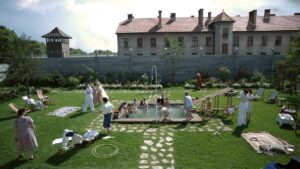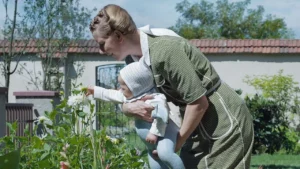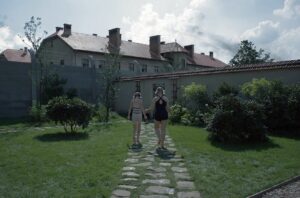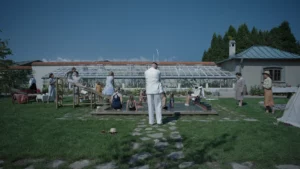Publication Date: 03-20-2024
The Zone of Interest (2023) review
Dir. Jonathan Glazer
By: Steve Pulaski
Rating: ★★★½
Before I talk about Jonathan Glazer’s The Zone of Interest — and there is indeed much to talk about — I must unfortunately begin another review of yet another A24 film that saw its theatrical release butchered. As soon as it was revealed that The Zone of Interest would receive a Best Picture nomination, A24 should’ve been expanding its release in theaters in the weeks leading up to the March 10th ceremony. Every other nominee in said category, including fellow foreign-language films Anatomy of a Fall and Past Lives (a fellow A24 property), was given the same treatment.
Not The Zone of Interest. To date, its widest release was 598 theaters across the United States (600 theaters is the fewest number to be considered a “wide release”). The film was in 571 theaters on the weekend of the Oscars, meaning by the time the ceremony took place, the vast majority of potential moviegoers had no way of seeing the film (the film also wasn’t on VOD at the time). Consider the South Korean film Parasite, which saw a release in over 2,000 theaters ahead of that year’s Oscars.
As was the case with Marcel the Shell with Shoes On, A24 inexplicably shafted another one of their films for no good reason other than presumably to double-down on the mystique and aura that surrounds many of their projects. They left money on the table, and rendered one of the most important movies released last year unseen ahead of an evening that saw it win two awards and its director give one of the most-discussed speeches of the evening.

Now, let’s shift attention to the film itself, a sobering essay-like work that continues to show, after decades of similarly sobering pictures, that there are many, uniquely compelling ways to tell a story about the Holocaust. This one takes place mostly in the elegantly curated middle-class home where Auschwitz commandant Rudolf Höss (Christian Friedel), his wife Hedwig (Sandra Hüller, Anatomy of a Fall), and their children live. Viewed from afar, the family lives an enviable life. Their home is a representation of the upward mobility they’ve been fortunate enough to experience. Hedwig’s garden is manicured; the children have a swimming pool; and everyone is content within the four walls of luxury they’ve been quick to embrace.
Underscoring almost every scene of otherwise wholesome domesticity is the white noise of the family’s neighbor, which is the Auschwitz Concentration Camp itself. The camp is never viewed, at least not from the inside, but the hum of train cars, screams of children and adults, gunshots, and other sounds rendered indistinguishable without context. It’s a horrifying juxtaposition no less, and sets the course for a 105-minute film that baldly depicts the banality of evil.
Glazer and cinematographer Łukasz Żal do some fascinating things with their cameras. The Hoss family are consistently filmed from a distance, which gives the impression that they are standing inside large-scale replicas of their home. Glazer’s camera sits at a fixed position, rendering lengthy static compositions captured from sharp angles that have characters walking in/out of view. In some cases, characters are a great distance away from the camera and that gradually come closer into the foreground. This aesthetic accentuates the cold detachment of the family from the atrocities being committed literally next door. It recalls Jeanne Dielman in the simultaneous attention-to-detail in its framing and blocking all while being impressionistic forcing you, the viewer, to fill in the gaps.

For Rudolf, his job is one defined by following orders and uprooting his family across Germany with the same goal in mind: exterminate hundreds of thousands of Jews as efficiently as possible. An early scene shows him sitting in on a meeting that has diplomats discussing how to best expedite the concentration camp chimneys so, when one finishes expelling smoke, the next can begin. For Hedwig, this is a life that provides incredible luxury. In another scene, she tries on a fur coat in front of a mirror, and discovers the previous owner’s lipstick in one of the pockets. The following scene shows her applying the lipstick. Even the children sift through a box of gold teeth that Rudolf has brought home.
“You really have landed on your feet, my child,” Hedwig’s mom tells her. It’s one of the most uncomfortable and coldly evil lines in the movie.
Later, Hedwig takes her mother for a tour of her garden, as Auschwitz’s trains can be heard chugging in the background, black smoke fills the air, and the stench of death becomes impossible to ignore. She doesn’t understand how anyone can get used to this. I suppose in the eyes of Rudolf and Hedwig, it would be no different than the noise they’d hear if they lived near an airport. They would treat it with the same kind of indifference.

At a pivotal time in the world where images, video, and other media can be manipulated to reflect what we want, a key component in The Zone of Interest is sanitation in the figurative and literal sense. Cleanliness in the Höss household becomes paramount, in no greater scene that when Rudolf notices the creek in which his children swim has become polluted by cremation ashes and other nastiness. The subsequent moments involve the kids being scrubbed with hot water. Rudolf is also unfaithful to Hedwig, and washes his privates in a slop sink before going back to him and his wife’s clean quarters.
The Höss family talks about death in such clinical, technical terms that the torture, starvation, and slaughter of literal millions doesn’t seem like anything other than protocol. This is scrubbing in a way that seeks to downplay crimes, or even wipe them away entirely.
Late in the film, editor Paul Watts breaks the narrative and cuts to present-day Auschwitz being swept, mopped, and vacuumed for visitors to enter. This kind of sanitation seeks to preserve and maintain. Such a disruption in a casually paced but intensely gripping film could’ve derailed it entirely. The Zone of Interest is so delicately handled and stunning in its execution that it becomes apparent early on that you’re watching the work of an impeccable craftsman, one who has found a way to tell a Holocaust story that hits you as if you never heard of it in the first place.
NOTE: The Zone of Interest is now playing in far too few theaters, but is also available to rent on multiple platforms.
Starring: Christian Friedel, Sandra Hüller, Johann Karthaus, Luis Noah Witte, Nele Ahrensmeier, Lilli Falk, and Anastazja Drobniak. Directed by: Jonathan Glazer.
About Steve Pulaski
Steve Pulaski has been reviewing movies since 2009 for a barrage of different outlets. He graduated North Central College in 2018 and currently works as an on-air radio personality. He also hosts a weekly movie podcast called "Sleepless with Steve," dedicated to film and the film industry, on his YouTube channel. In addition to writing, he's a die-hard Chicago Bears fan and has two cats, appropriately named Siskel and Ebert!


